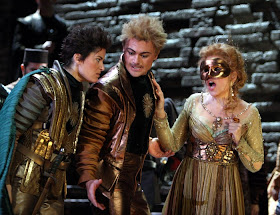 |
Fleming’s fame comes from operas of a rather different kind, those of Strauss, Dvořák, and Tchaikovsky, as well as Handel and Mozart, although to a lesser degree. Thus far, however, the bel canto repertoire has eluded her, largely because her vocal style is not suited to it. Instead of reducing the wide swath of her voice, so suited for the larger late Romantic repertoire, to a slender ribbon of sound, she often powers her way through delicate lines and high pianissimi, with a thicker, creamier tone and heavier vibrato. Where clean attacks would be preferred, she has a tendency to scoop up to the note, and her renditions of complex fioriture, the bread and butter of the bel canto soprano, have never been that agile or well delineated. Here Fleming showed a willingness to control some of those mannerisms, especially in her Act I aria “Com’è bello,” which had a calm simplicity quite appropriate to the bel canto style. Scooping, sour intonation, and raw low notes returned throughout the evening, however, especially when she seemed to let her guard down and react more instinctively.
William Ashbrook, Donizetti and His Operas |
 Ruggero Raimondi and Renée Fleming in Lucrezia Borgia, Washington National Opera, photo by Karin Cooper |
The best singing of the evening came from mezzo-soprano Kate Aldrich in the trouser role of Gennaro’s friend Orsini, with a rich instrument of many beautiful colors, from a sweet top with some zing down to a volcanic, rich chest voice. Lucrezia’s villainous husband, Alphonso, played to the strengths of the snarling Ruggero Raimondi, who struggled with his highest notes but was a resonant, black leather-caped presence. The only weak link was tenor Vittorio Grigolo as Lucrezia’s long-lost son Gennaro. Grigolo’s pop star good looks may make up for a harsh tone and imprecise technique in some people’s books, especially those who went wild as he took his curtain call shirtless, but not mine. If the originally announced tenor, Giuseppe Filianoti, had not had to be replaced due to a scheduling conflict, it would have been a near-perfect storm. Among the supporting cast, Chinese tenor Yingxi Zhang had a consistently pleasing turn as Gastone. The company’s general director, Plácido Domingo, did no real harm on the podium, but at least some of the ensemble problems are due to his spastic conducting technique.
Anne Midgette, 'Lucrezia Borgia': Uneven but Not Uneventful (Washington Post, November 3) Anthony Tommasini, In a Man’s World, Poison Is Her Best Revenge (New York Times, November 3) [T. L. Ponick], 'Lucrezia' gets her due (Washington Times, November 3) Tim Smith, Fleming shines in fanciful 'Borgia' (Baltimore Sun, November 6) George Loomis, Lucrezia Borgia, Washington National Opera (Financial Times, November 6) Kate Wingfield, Lady Killer (Metro Weekly, November 6) Lucrezia Borgia: Deep Space Nine (Out West Arts, November 6) William Braun, Pretty Poison (Opera News, November 2008) Greg Marzullo, Coming Full Circle (Washington Blade, October 31) |
Pascoe’s decision to have the two friends discover a shared homosexual love together was ultimately just silly, as they continued to make out in the party scene, before and during the brindisi. The director also made Fleming’s costumes more masculine with each passing act, so that she entered the final scene in doublet and full-length boots, with a sword at her side. Worse, Pascoe also decided to have Lucrezia slit her own throat with a dagger, as if singing an extravagant and ultimately unnecessary cabaletta and falling upon the son murdered by her own poison was not dramatic enough. And Donizetti and Romani thought they had troubles with the censors the way they wrote it.
Washington National Opera's production of Donizetti's Lucrezia Borgia will receive six more performances, some starring Renée Fleming (November 5, 9, and 11) and some starring Sondra Radvanovsky (November 7, 15, and 17). More about La Radvanovsky's Lucrezia next week!
Renée Fleming sings "Era desso il figlio mio"
Sad thing is that ten years ago, she didn't scoop and her voice was actually quite well suited to the role. Then fame bit her in the posterior and since then she's done for opera what Thomas Kinkade has done for painting.
ReplyDeleteThank you for recognizing that the rough ensembles were partly (I would say mostly) due to Domingo's conducting. Midgette and Tommasini got this all wrong.
ReplyDelete